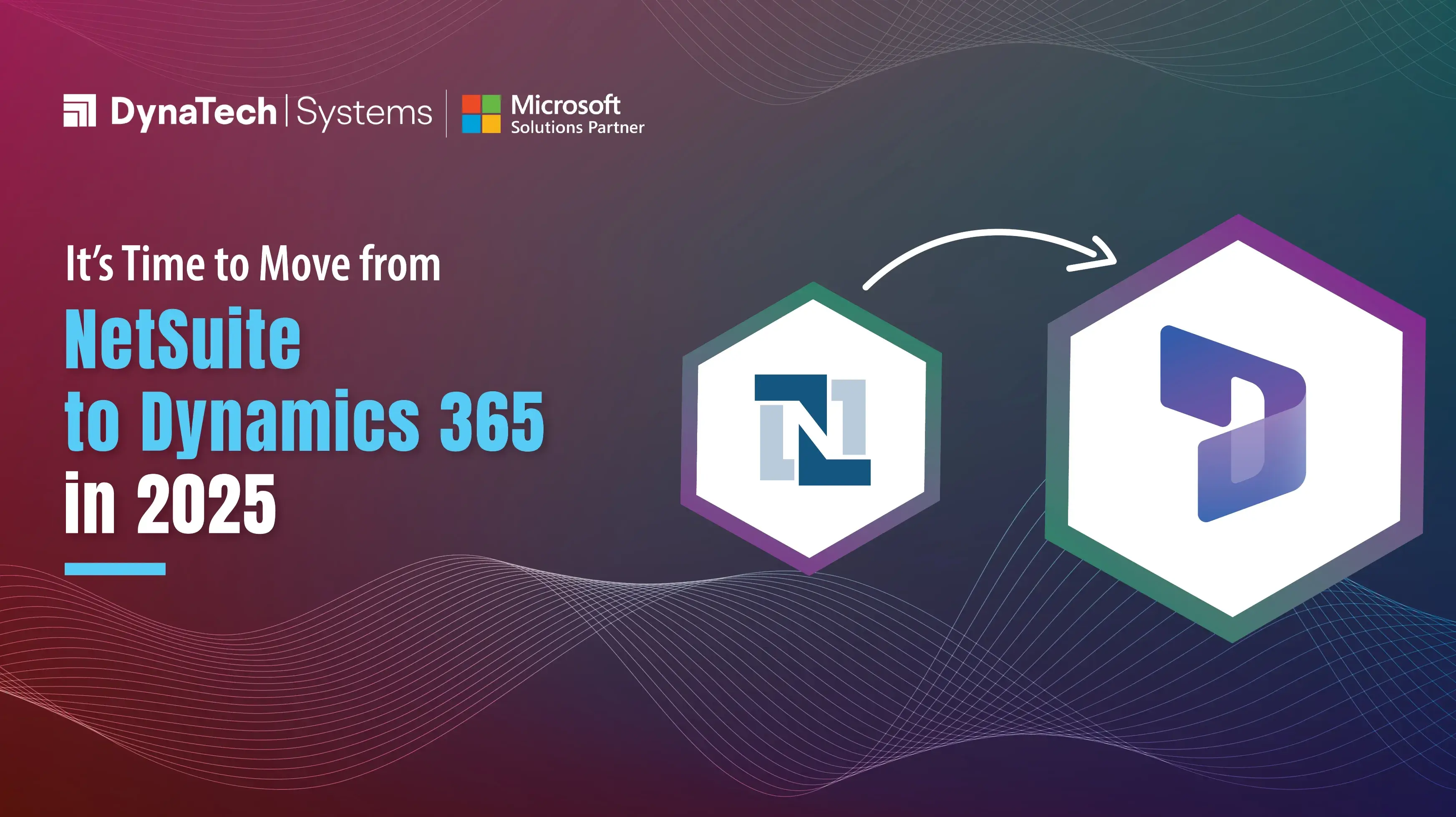Are you using the traditional ERP system to manage your business operations? Is your enterprise facing operational inefficiencies, limited scalability, and lack of advanced analytics that are slowing you down? You’ve been using NetSuite, but its limitations are evident as you aim for transformative growth. What’s the solution? Enter Microsoft Dynamics 365, a modern, scalable, and feature-rich ERP system designed for businesses ready to embrace the future.
If your current ERP system is holding you back, this blog will explore why moving from NetSuite to Dynamics 365 in 2025 makes perfect sense. From technical details to a one-on-one comparison, we’ll break down why Dynamics 365 is the go-to choice for businesses.
Why Companies Are Switching: The Problem with NetSuite
A lot of businesses using NetSuite face the below mentioned common challenges like:
- Customization Complexity: NetSuite offers very limited flexibility in terms of customization. If you want tailored solutions, you have to pay high costs.
- Scalability Issues: Scaling NetSuite to meet enterprise needs can be a very expensive and cumbersome process.
- Integration Gaps: Integrating NetSuite critical third-party apps or legacy systems can be challenging.
- Licensing and Costs: It includes several hidden fees. This can be particularly experienced once your business processes start expanding.
- Lack of Innovation: NetSuite lacks the modern world’s advanced technologies like AI-driven analytics or any other high-end automation tools.
Key Capabilities That Set Dynamics 365 Apart
1. Artificial Intelligence and Predictive Insights
Dynamics 365 incorporates AI to enable predictive analytics, smart suggestions, and automated decision-making. Examples include:
- AI-driven sales forecasting.
- Sentiment analysis in customer service.
- Intelligent inventory predictions for supply chains.
2. Unified Data and Analytics
Dynamics 365 offers a unified view of data across all modules, breaking down silos between departments. With Microsoft Dataverse as its foundation, businesses can:
- Access consistent data across applications.
- Leverage real-time insights for proactive decision-making.
3. Customization and Flexibility
Dynamics 365 allows extensive customization through built-in tools and third-party integrations. Businesses can:
- Modify workflows and user interfaces.
- Extend functionalities with industry-specific solutions, like DynaTech’s Steel Add-On or Non-Profit Accelerator.
4. Seamless Integration with Microsoft Ecosystem
Dynamics 365 integrates natively with Microsoft tools like Office 365, Azure, and Teams. This ensures:
- Faster adoption for users familiar with Microsoft products.
- Enhanced collaboration with built-in Teams functionality.
5. Cloud-Based Scalability
As a cloud-native platform, Dynamics 365 supports global operations, ensuring reliability, scalability, and security. Benefits include:
- Minimal upfront infrastructure costs.
- Regular updates without downtime.
6. Industry-Specific Capabilities
Microsoft Dynamics 365 caters to various industries with tailored solutions for manufacturing, healthcare, e-commerce, and more. For instance:
- Manufacturing: Advanced inventory management and production scheduling.
- Retail: Omnichannel sales and customer personalization.
- Healthcare: Patient engagement and operational efficiency.
NetSuite vs. Dynamics 365: A Detailed Comparison
Feature-by-Feature Comparison Table
|
Category |
NetSuite |
Dynamics 365 |
|
Deployment Options |
Cloud only |
Cloud, on-premises, or hybrid |
|
Customization |
Limited and costly |
Flexible with tools like Power Apps, Power Automate, and Azure |
|
AI Capabilities |
Basic insights |
Advanced AI with Copilot for automation, predictions, and real-time recommendations |
|
Integration |
Moderate integration |
Deep integration with Microsoft ecosystem and third-party tools |
|
Scalability |
Suitable for mid-sized businesses |
Scales effortlessly for SMBs and enterprises |
|
Pricing Transparency |
Hidden fees and limited packages |
Transparent pricing and modular pay-as-you-grow options |
|
Data Management |
Basic reporting and analytics |
Advanced analytics with Power BI, Microsoft Fabric, and AI-driven insights |
|
Security |
Limited advanced security features |
Robust compliance, built-in security measures, and seamless identity protection with Azure Active Directory |
|
Global Support |
Limited regions supported |
Extensive global operations support |
Technical Advantages of Dynamics 365 Over NetSuite
1. Advanced Data Analytics
While NetSuite provides basic reporting tools, Dynamics 365 leverages Power BI and Azure Synapse Analytics for:
- Real-time data visualization.
- Predictive analytics powered by machine learning.
- Advanced dashboards are customizable for roles and departments.
2. Integration with AI Tools
NetSuite lacks advanced AI tools, while Dynamics 365 provides:
- Copilot for Dynamics 365: AI-powered assistants for Finance, Sales, and Customer Service.
- Automated workflows using Power Automate, reducing manual tasks.
3. Seamless Data Migration
With NetSuite data migration, businesses often face complexities like data loss or inaccuracies. However, Dynamics 365 Migration Tools streamline this process through:
- Pre-built templates for smooth data transfer.
- Automated validation to ensure accuracy.
- Ongoing support for post-migration activities.
Making the Switch from NetSuite to Dynamics 365 with DynaTech
You’ve completed your preparation and planning—now it’s time to move forward with the official migration to Microsoft Dynamics 365. At DynaTech, we’re here to guide you through each stage of the process, ensuring a seamless transition that minimizes disruptions and maximizes value.
1. Back Up All Data
Before starting the migration, it’s critical to back up all your client data securely. While this step might seem straightforward, it’s essential for safeguarding your information against potential mishaps during the migration process.
2. Exporting and Importing Data
Exporting data from NetSuite can be tricky, as it doesn’t support a single, consolidated export for all records. If you encounter difficulties, a practical approach is to run saved searches for specific datasets and export them in manageable segments.
For the import into Dynamics 365, ensure your data is formatted as .xls or .csv files. DynaTech’s migration specialists use advanced tools like Data Migration Assistant to streamline this process, ensuring data consistency and integrity throughout the transition.
3. Setting Up New Integrations
Once your data is successfully migrated to Dynamics 365, it’s time to set up integrations that enhance your operations. As Dynamics 365 is powered by Microsoft, connecting it to other applications within the Microsoft ecosystem is seamless. Here are some integration options DynaTech can implement for you:
- Office 365: Link Excel, Word, and Outlook for seamless document management and communication.
- Customer Portals: Centralize tools and resources for better user accessibility.
- AI Builder: Automate tasks like lead scoring, record-keeping, and workflow management using built-in AI capabilities.
- Azure Communication Services: Enable calls, texts, and live chat services directly from Dynamics 365, with transcripts automatically saved to client files.
For businesses with specific needs, DynaTech offers custom integrations tailored to unique workflows and industry requirements.
Living With the Switch
Once your migration is complete, the next step is ensuring that your team is equipped to work effectively with Dynamics 365. This involves training, testing, and optimizing workflows to maximize the system’s potential.
Training Sessions for Your Team
Adjusting to Dynamics 365 means unlearning old NetSuite habits and developing new workflows. DynaTech provides comprehensive training programs for:
- End-Users: Focused on day-to-day operations and tasks.
- Superusers: Advanced training to troubleshoot issues and optimize system use.
- Admins: In-depth sessions on system management, security, and customizations.
Our team of Dynamics 365 experts has managed hundreds of successful migrations, ensuring your team is fully prepared to leverage the platform’s capabilities.
Looking for a Reliable Migration Partner?
At DynaTech Systems, we provide end-to-end consulting and implementation services, including:
- Initial Planning and Design: Crafting a detailed migration roadmap.
- Seamless Implementation: Utilizing advanced tools for data transfer and integrations.
- Training and Support: Ongoing assistance to ensure post-migration success.
Modern technology evolves rapidly, and staying ahead requires expertise and agility. With DynaTech as your consulting partner, you’ll not only adapt to change but thrive in the competitive market.
Ready to explore your migration options? Contact DynaTech today to start your journey from NetSuite to Dynamics 365. Together, we’ll ensure a seamless transition that positions your business for long-term success.




























